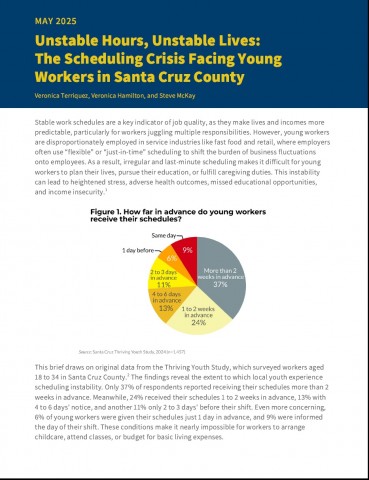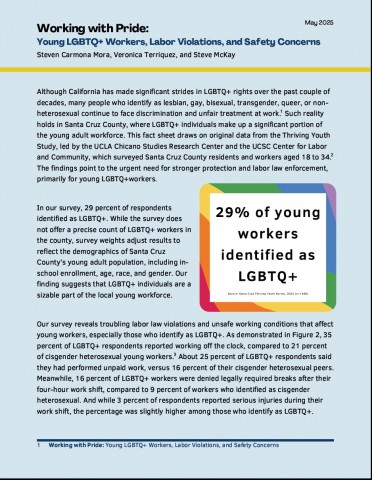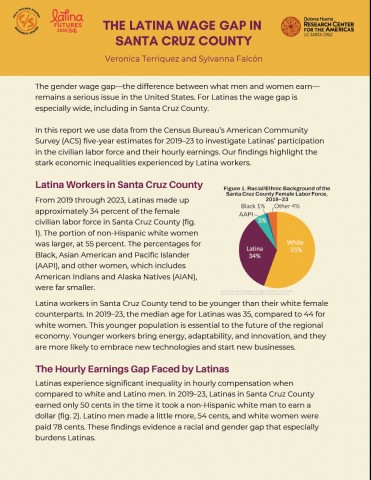New Reports Point to Underlying Workforce Issues in Santa Cruz County
UCLA and UC Santa Cruz researchers found wage gaps, unstable work schedules, and discrimination against LGBTQ+ workers
May 16, 2025 (Los Angeles, CA) — Three new research reports focused on work environments in Santa Cruz County found wage, gender, and scheduling issues.
The analysis, led by UCLA and UC Santa Cruz faculty and graduate students, look at data from the United States Census Bureau’s American Community Survey (ACS) and thousands of surveys primarily focused on Santa Cruz County workers ages 18 to 34.
One report, focused on Latina workers, found that although Latinas make up about one-third of the female civilian labor force in the county, they earn 50 cents less in the time a non-Hispanic white man earns one dollar. This research was a collaborative effort between the Latina Futures 2050 Lab housed at the UCLA Chicano Studies Research Center, and the Dolores Huerta Research Center for the Americas at UC Santa Cruz.
Researchers for the three studies spent over a year analyzing data in order to understand the economic inequities faced by a portion of the county’s population. Findings will be released today, May 16, at 5 p.m. during a public event at The 418 Project, 155 S. River St. UC Santa Cruz’s Center for Labor and Community will host a community resource fair and information sessions presented by The Emergency Workplace Organization Committee and workers who led successful campaigns to unionize at Starbucks, REI, and Oakland Educators Association.
Highlights from the three reports:
The “Latina Wage Gap in Santa Cruz County” report, authored by Veronica Terriquez, professor of urban planning and Chicana/o and Central American studies and Sylvanna Falcón, professor in the Department of Latin American and Latino Studies and member of the Dolores Huerta Research Center for the Americas executive committee. The report looks at the United States Census Bureau’s American Community Survey, a five-year data set (2019-23) that analyzes Latinas’ participation in the civilian labor force and their hourly earnings. Notable findings:
- Latinas earned only 50 cents in the time it took a non-Hispanic white man to earn a dollar
- Latinas made up approximately 34% of the female civilian labor force in Santa Cruz County
- Latino men made 54 cents and white women were paid 78 cents
“Many Latinas are the primary earners in their households, and they contribute significantly as taxpayers and community members. When they are underpaid, the impact extends beyond individual workers, affecting families’ ability to access housing, education, and healthcare and to plan for retirement,” the authors wrote in their analysis. “Because Latinas make up about a third of the female workforce in Santa Cruz County, the consequences of their financial challenges ripple across the entire region.”
The “Working with Pride: Young LGBTQ+ Workers, Labor Violations, and Safety Concerns” report, authored by Steven Carmona Mora, master’s student in the UCLA Department of Urban Planning, Veronica Terriquez, and Steve McKay, professor of sociology and director of the Center for Labor and Community at UC Santa Cruz, looks at residents and workers ages 18 to 34 and pulls from original data from the Thriving Youth Study, led by the UCLA Chicano Studies Research Center and the UCSC Center for Labor and Community. Notable findings:
- 35% of LGBTQ+ respondents reported working off the clock, compared to 21 percent of cisgender heterosexual young workers
- Approximately 25% of LGBTQ+ respondents said they had performed unpaid work, versus 16 percent of their cisgender heterosexual peers
- 16% of LGBTQ+ workers were denied legally required breaks after their four-hour work shift, compared to 9 percent of workers who identified as cisgender heterosexual
“Further study is underway to help explain why LGBTQ+ workers in Santa Cruz County experience higher rates of wage theft and workplace injury,” researchers wrote in their report. “Previous research has shown that nationally, LGBTQ+ people face more discrimination than their cisgender heterosexual peers and are overrepresented in specific industries such as food service, retail, and education … Strengthening enforcement of existing labor laws and bolstering anti-discrimination protections allow LGBTQ+ workers to demand their rights without fear of retaliation.”
The “Unstable Hours, Unstable Lives: The Scheduling Crisis Facing Young Workers in Santa Cruz County” authored by Veronica Terriquez, Veronica Hamilton, Ph.D. student in social psychology and a graduate student researcher at the Center for Labor and Community at UC Santa Cruz, and Steve McKay, find that young workers are disproportionately employed in service industries like fast food and retail, where employers often use “flexible” or “just-in-time” scheduling to shift the burden of business fluctuations onto employees. As a result, irregular and last-minute scheduling makes it difficult for young workers to plan their lives, pursue their education, or fulfill caregiving duties. Notable findings:
- 39% of workers receive their schedules with less than a week’s notice
- 37% of respondents reported receiving their schedules more than 2 weeks in advance
- This can present a challenge, especially for the 13% of young workers who are parents and the 46% enrolled in school
“In this context, having advance notice of work schedules is not merely a convenience — it is a foundation for economic and domestic stability as well as upward mobility,” the researchers wrote in their report. “Unions play a vital role in efforts to regularize working hours, and these findings can inform organizing efforts to unionize young workers in Santa Cruz County. According to our January 2025 Union Curious report, many young workers in Santa Cruz express interest in joining a union and organizing campaigns should appeal to them by prioritizing predictable scheduling.”
The following reports released at the event are linked below and available on the UCLA Chicano Studies Research Center website: www.chicano.ucla.edu/publications/report-brief



